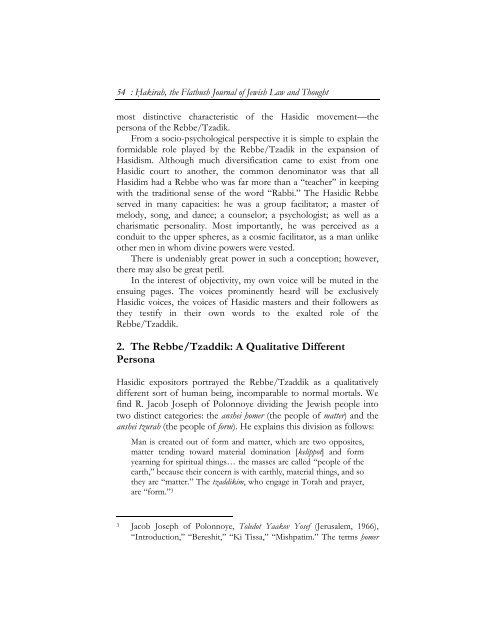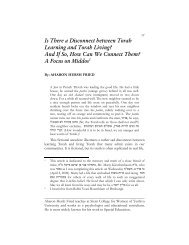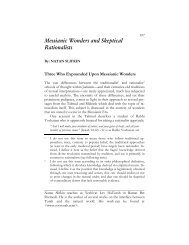Hasidism and the Rebbe/Tzaddik: The Power and Peril of ... - Hakirah
Hasidism and the Rebbe/Tzaddik: The Power and Peril of ... - Hakirah
Hasidism and the Rebbe/Tzaddik: The Power and Peril of ... - Hakirah
Create successful ePaper yourself
Turn your PDF publications into a flip-book with our unique Google optimized e-Paper software.
54 : Ḥakirah, <strong>the</strong> Flatbush Journal <strong>of</strong> Jewish Law <strong>and</strong> Thought<br />
most distinctive characteristic <strong>of</strong> <strong>the</strong> Hasidic movement—<strong>the</strong><br />
persona <strong>of</strong> <strong>the</strong> <strong>Rebbe</strong>/Tzadik.<br />
From a socio-psychological perspective it is simple to explain <strong>the</strong><br />
formidable role played by <strong>the</strong> <strong>Rebbe</strong>/Tzadik in <strong>the</strong> expansion <strong>of</strong><br />
<strong>Hasidism</strong>. Although much diversification came to exist from one<br />
Hasidic court to ano<strong>the</strong>r, <strong>the</strong> common denominator was that all<br />
Hasidim had a <strong>Rebbe</strong> who was far more than a “teacher” in keeping<br />
with <strong>the</strong> traditional sense <strong>of</strong> <strong>the</strong> word “Rabbi.” <strong>The</strong> Hasidic <strong>Rebbe</strong><br />
served in many capacities: he was a group facilitator; a master <strong>of</strong><br />
melody, song, <strong>and</strong> dance; a counselor; a psychologist; as well as a<br />
charismatic personality. Most importantly, he was perceived as a<br />
conduit to <strong>the</strong> upper spheres, as a cosmic facilitator, as a man unlike<br />
o<strong>the</strong>r men in whom divine powers were vested.<br />
<strong>The</strong>re is undeniably great power in such a conception; however,<br />
<strong>the</strong>re may also be great peril.<br />
In <strong>the</strong> interest <strong>of</strong> objectivity, my own voice will be muted in <strong>the</strong><br />
ensuing pages. <strong>The</strong> voices prominently heard will be exclusively<br />
Hasidic voices, <strong>the</strong> voices <strong>of</strong> Hasidic masters <strong>and</strong> <strong>the</strong>ir followers as<br />
<strong>the</strong>y testify in <strong>the</strong>ir own words to <strong>the</strong> exalted role <strong>of</strong> <strong>the</strong><br />
<strong>Rebbe</strong>/<strong>Tzaddik</strong>.<br />
2. <strong>The</strong> <strong>Rebbe</strong>/<strong>Tzaddik</strong>: A Qualitative Different<br />
Persona<br />
Hasidic expositors portrayed <strong>the</strong> <strong>Rebbe</strong>/<strong>Tzaddik</strong> as a qualitatively<br />
different sort <strong>of</strong> human being, incomparable to normal mortals. We<br />
find R. Jacob Joseph <strong>of</strong> Polonnoye dividing <strong>the</strong> Jewish people into<br />
two distinct categories: <strong>the</strong> anshei ḥomer (<strong>the</strong> people <strong>of</strong> matter) <strong>and</strong> <strong>the</strong><br />
anshei tzurah (<strong>the</strong> people <strong>of</strong> form). He explains this division as follows:<br />
Man is created out <strong>of</strong> form <strong>and</strong> matter, which are two opposites,<br />
matter tending toward material domination [kelippot] <strong>and</strong> form<br />
yearning for spiritual things… <strong>the</strong> masses are called “people <strong>of</strong> <strong>the</strong><br />
earth,” because <strong>the</strong>ir concern is with earthly, material things, <strong>and</strong> so<br />
<strong>the</strong>y are “matter.” <strong>The</strong> tzaddikim, who engage in Torah <strong>and</strong> prayer,<br />
are “form.” 3<br />
3 Jacob Joseph <strong>of</strong> Polonnoye, Toledot Yaakov Yosef (Jerusalem, 1966),<br />
“Introduction,” “Bereshit,” “Ki Tissa,” “Mishpatim.” <strong>The</strong> terms ḥomer

















